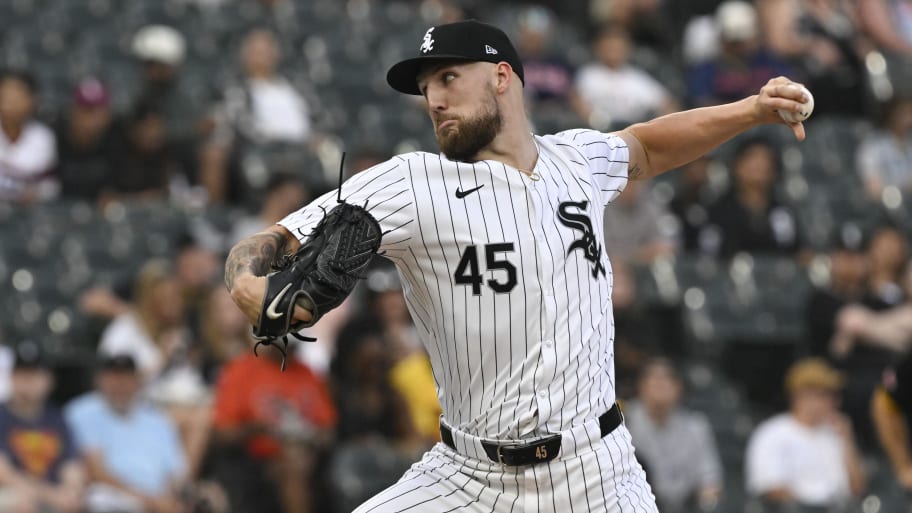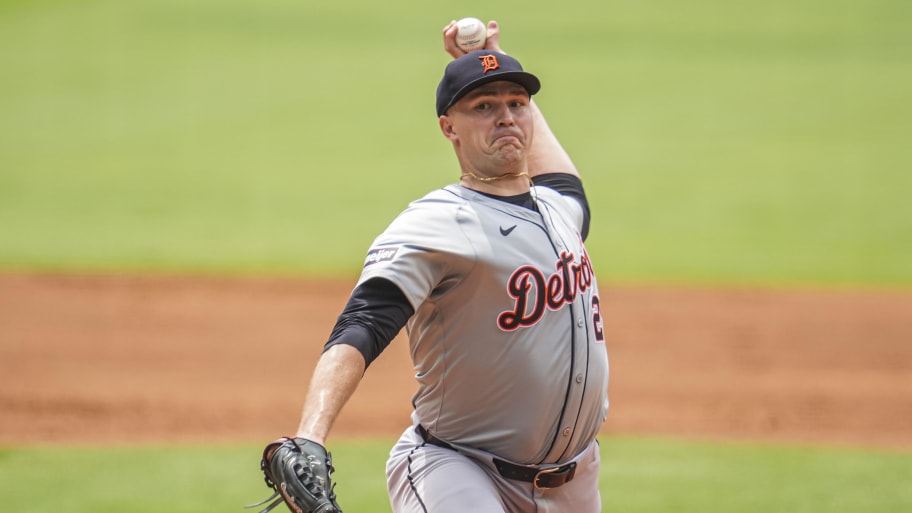
The trade deadline looms for teams like one of those “last chance for gas” filling stations on a rural highway. Every team in contention is under pressure to address a roster flaw that could impact getting to, or through, October. While this may not be a loaded field of blockbuster names this year, 24 of the 30 teams are within six games of a postseason spot and that means this will be an active deadline. Standing pat is not an alternative.
Each trade deadline one team looms as the key player at the card table. Last year it was the New York Mets, who moved Max Scherzer, Justin Verlander, David Robertson, Mark Canha, Tommy Pham and Dominic Leone.
And each year one team comes out of the deadline as a clear and aggressive winner. Last year it was the Texas Rangers, who reached the deadline in a 2–7 slump that cut their division lead from 4 1/2 games to one. Then they acquired Scherzer, Jordan Montgomery, Chris Stratton and Austin Hedges, and immediately won eight in a row and 12 of 14. (Scherzer and Montgomery were 5–1 in that run.) Acquiring two playoff starters? That’s a big win, even before Texas went on to win the World Series.
Which team holds the most cards this year before the Tuesday deadline? Which team is one move away from winning the World Series? Here are the teams to watch: the six biggest trade deadline influencers.
1. Chicago White Sox
Sure, White Sox GM Chris Getz does not have to make a move. If he doesn’t hear what he likes, he has all winter to keep his shop open. But then he loses leverage. The time to strike is now with so many teams in contention and wanting pitchers Garrett Crochet and Michael Kopech and outfielder Luis Robert for as many playoff runs as possible. Pitcher Erick Fedde and outfielder Tommy Pham almost surely will be moved.
Here’s the problem with Crochet: the White Sox rightfully value him as a controllable Game 1 or 2 playoff starter but interested teams are wary of his workload and value him as a potential Game 1 or 2 playoff starter who could wind up in the bullpen. The difference in perceived value makes him difficult to move, but not impossible. Getz has a moment to make a big pivot with this organization and he should take it, not defer it.
2. Baltimore Orioles
They want ace Tarik Skubal from the Detroit Tigers, the most impactful player available. Skubal could help Baltimore win the World Series this year and/or fortify a rotation that next year will be without Corbin Burnes, John Means and Kyle Bradish. Detroit, with an offense that has come alive in July, would only move Skubal if it is blown away. The Orioles are so deep in position players they could do that without including Jackson Holliday. Choose two or three from among Colton Cowser, Kyle Stowers, Heston Kjerstad, Connor Norby, Coby Mayo and Samuel Basallo. The Orioles are in a bidding war with the Los Angeles Dodgers to convince the Tigers to make a bold move they prefer not to make.
Skubal and Crochet are the best impact-level starters in play. Baltimore needs one of them. Settling for the White Sox’ Fedde, Tigers’ Jack Flaherty or Toronto Blue Jays’ Yusei Kikuchi is not the same. Bottom line: the Orioles must trade from their depth of position players to add an impact starter or swing-and-miss bullpen arm.
3. Tampa Bay Rays
They already have moved pitchers Aaron Civale and Phil Maton, though those moves solved roster issues more than signaling that they’re out. The Rays are half in and half out and they operate in a market with little public pressure because their fans are accustomed to roster churn. That makes the Rays a dangerous player in this market.
The Rays have roster-finishing pieces that are attractive to teams headed to the playoffs: outfielder Randy Arozarena, infielder Isaac Paredes and pitchers Zach Eflin, Zack Littell and Pete Fairbanks. They can afford to be aggressive in taking advantage of the sellers’ market.
4. Toronto Blue Jays
After the Jays spent $400 million to renovate their ballpark, their attendance is down almost 3,000 fans per game, the sixth biggest decline in baseball. They haven’t won a postseason game in seven years under three managers but with the same front office leadership. This is a bottom six run production team. The mix seems stale.
So, yes, the Jays need to be active, especially with pitchers Chad Green, Yimi García, Chris Bassitt and Kikuchi. But Bo Bichette, who is on the injured list, and Vlad Guerrero Jr. should remain in Toronto for now. Guerrero especially is a franchise player who should be extended, not moved. A year from now, if those talks reach a dead end and Toronto is not contending, only then do you think about moving him.

5. Los Angeles Dodgers
With their resources, farm system and pressure, the Dodgers go on this list every year. Nothing is out of play with them, especially now that their huge investments in pitching still have not left them with a reliable postseason rotation two months away from NLDS Game 1.
Last year the Dodgers scooped up Lance Lynn, Joe Kelly, Enrique Hernandez, Ryan Yarbrough and Amed Rosario, a shopping spree that was mostly meh. They lost three straight to Arizona in the NLDS in which all three starters, Clayton Kershaw, Bobby Miller and Lynn, were gone before the third inning was over.
This year they need Skubal or Crochet and a run-producing bat to lengthen their lineup. Incremental upgrades are not the goal this time. The Dodgers need impact.
6. New York Yankees
On Tuesday night, Alex Verdugo bunted with runners at first and second. In the fourth inning. With a lead (1-0). With the number 8 and 9 hitters behind him, Carlos Narvaez (playing his second major league game) and DJ LeMahieu (batting .181). Against a lefty, José Quintana of the Mets, with neutral platoon splits. It was a poor choice that underscored his lack of confidence, especially in a 3-for-36 slide and his troubles all year against lefthanded pitching (.196).
That’s just a snapshot of how much the Yankees struggle to generate offense when anybody other than Juan Soto and Aaron Judge are in the box. Soto and Judge have taken 23% of the Yankees’ plate appearances. New York has given 45% of its plate appearances to Verdugo, LeMahieu, Anthony Rizzo, Gleyber Torres, Trent Grisham, Ben Rice and Oswaldo Cabrera. They have returned a .221 batting average. All of them have an OBP under .300 except for Torres (.307), and he is the worst hitter in the league against non-fastballs (.153, tied with JJ Bleday of Oakland; minimum 1,500 pitches).
The bottom line is that the Yankees give way too many at-bats to too many hitters who have not hit and will not hit. They have given more than 100 plate appearances to nine players with a below average OPS+. Only the White Sox, Blue Jays and Marlins have more such dead spots.
Need more proof the Yankees need offense? Their cleanup hitters are batting .203, the worst in franchise history and fourth-worst ever in a season of at least 100 games. (Only the 2022 Marlins, 1992 Angels and 2022 Pirates were worse.) Their infielders are hitting .233, fourth-worst in franchise history.
Yes, Giancarlo Stanton is coming back, and he will help lengthen the lineup. But more is needed.
This article was originally published on www.si.com as Six MLB Teams That Will Most Impact the Trade Deadline and Postseason Race.







